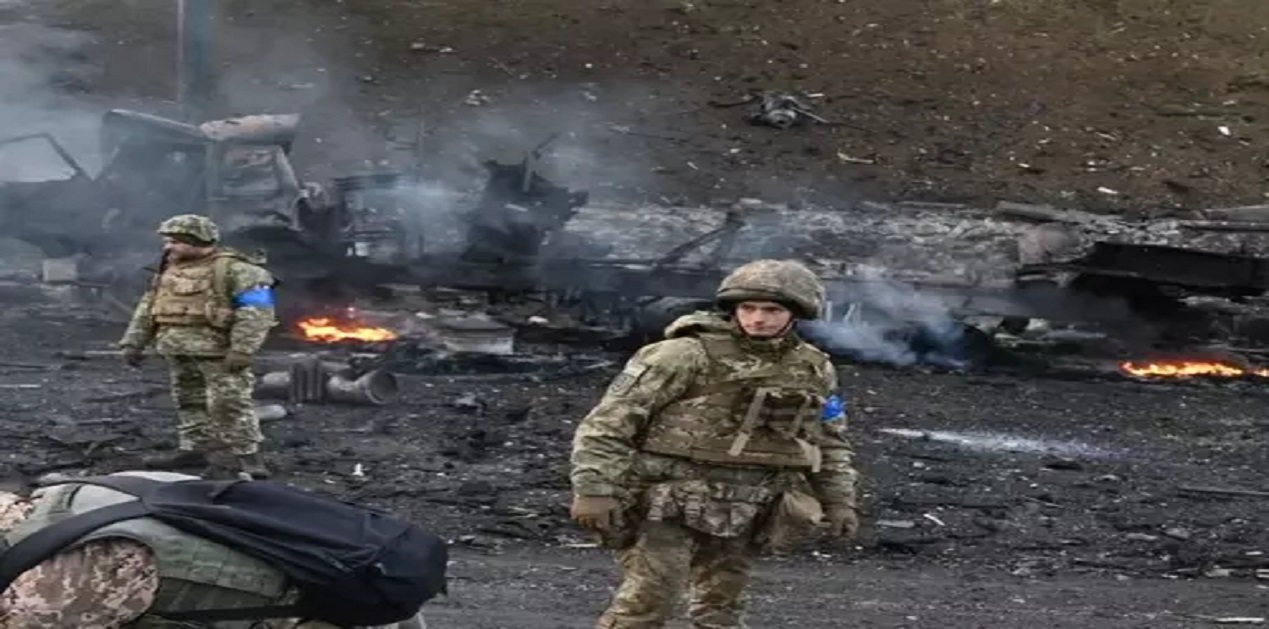Since it began, the Russia-Ukraine has thrown up an overabundance of geopolitical, geo-economic and geostrategic lessons. It is humbling to note that the lessons of 2021 were in total variance with those of 2022. India has learnt significant geostrategic lessons too in last three years, especially of the untrustworthiness of the Northern neighbour. Though there were writings on the wall, these were largely unread, in the hope of improvement in relations!
In fact learning from war (collection, assessment, sharing and absorption of lessons) is a serious business and difficult proposition. There are also other challenges and demands placed on the military, like the thrust on ongoing counter-terrorist operations, bureaucratic resistance (even military bureaucracy) and crystal-gazing the futuristic battle-space, makes planning for the next conventional fight, onerous. There also ought to be a learning culture, on peace and war, conduct of war fighting, future capability matrix and optimal military organisations in future conflicts! Case in point in India is the continual rubbing-in and solidified positions on Theatreisation that seem most distasteful, and would bring in immense satisfaction across disputed borders! It however must be said that lives of the future military generations and the reputation of Indian nation depends on learning and adaptation. Understandably, large number of lessons in Ukraine-Russia war may not be relevant to us, and be of generic nature. Yet, we have to learn from successes and failures of others. Contextually, in this stream of lessons being generated of the Russian-Ukraine War, another six need focus.
Lesson1. War in not Inevitable. As Ukraine war has shown, the economic costs globally have been very severe and long lasting, the humanitarian costs overwhelming and devastating. Maybe there was political sagacity and diplomatic acumen possible that did not involve the military, to avert the immense bloodshed and human miseries. As is evident now, absolute victory in improbable for any side! Politico-diplomacy has to look ahead, build relationships, explore drivers and trends, heed warnings on the horizon, and prevent explosion to a war. Once a war commences, it runs its own course, with no assurances thereafter.
Political rationality and preventive diplomacy to avert disputes and escalation, like the ones faced by India in the disputed northern borders, is imperative. Suffice it to say that fixated, inflexible positions do not lend to enduring peace. It must be stated that finding such a path will not be easy, though it is important to aspire for. Any and all compromises would come at an immense price. There will be issues of preparing the nation, prior to talking of an "off ramp" way on compromise.
Lesson 2. The Fallacy of Economic Interdependence. Will growing economic interdependence with adversaries decrease the chance of war? It is contended that trade relationship leads to positive expectations and provides incentive to stay peaceful. Indeed if these expectations are belied, political and commercial leaders are likely to fear a loss of access to raw materials and markets, which will give them more incentive to protect their commercial interests. However that economic interdependence will constitute a safeguard against war, is not tenable. Pre World War 1, international finance and trade had become so interconnected in Europe that the use of military force was economically futile. Yet, a prolonged war did take place. Obviously political considerations come first. Russia’s weaponization of interdependence on Russian energy supplies to Europe (and Ukraine) have not stood up to propel peace or acceptance of Russian demands.
China, as a 21st Century revisionist power and not a democracy, is post 20th Party Congress largely single-man-rule. The commercial or other interest groups with a $125Bn plus trade cannot influence the political leadership for belligerence against India. Additionally strong nationalism will make benign cooperation with India that much more difficult. It will be a risky option and a fallacy for India to plan on high levels of economic interdependence to result in peace.
Lesson 3. Peace is fragile and illusory. Ukraine-Russia 2022 have proven, what India witnessed against China in 2020, as to just how fragile peace is. With five strong India-China Agreements from 1993 to 2013, and the Minsk 1 and 2 between Ukraine and China, it is simple to see how easy it is for nations to break treaties and faith and how quickly situation can transcend to genuine catastrophe. The India-China Agreements like the Minsk agreements were illusions of peace. We had over three decades to convince ourselves to believe that “this can’t happen here,” and overnight that illusion was shattered. It happened in Eastern Ladakh and continues to happen in Arunachal Pradesh. Irrespective of the historical correctness or otherwise on the respective positions on the origins the border; it will continue to happen unless it is prevented from happening, by clear delineation and demarcation. This is currently not even on distant horizon. Peace cannot be taken on a set of assumptions of stability and predictability of human behaviour of adversarial leadership.
cLesson 4. The ‘unthinkable’ (conventional war) is possible. The most important and brutal lesson of Ukraine is that major conventional war between large nations is possible — even under the shadow of nuclear weapons. For decades, we have viewed major conventional wars as a relic of the past for fair and logical reasons - nuclear deterrence, economic interdependence and QUAD-a strategic security dialogue. “Hard power” is back with a vengeance, as Ukraine saw. The need for real kinetic capability and the National Will to use it are imperative to deter our adversaries. Wars are purposeful, with some stated (but could be untrue) aims and objectives– like territory; some ‘deep’ and political, like to bend the adversary’s Will. For us too, territorial bickering by the adversary as the stated objective, cannot be taken as the only bedrock of mutual differences. Territory can be another illusion to disallow India to reach her ‘potential’.
There is also a strong intersection of conventional and irregular in warfare, where irregular and asymmetric warfare is more than a match for conventional superiority. The US and NATO would have learnt this at great peril in Afghanistan. It is also apparent that Syrian National Army mercenaries fought in Armenia-Azerbaijan war in 2020, the Warner Group and Blackwater private security companies (PSC) are fighting alongside conventional forces in Ukraine in 2022. China is turning to irregular warfare to achieve strategic aims. Irregular warfare is central to modern Chinese military strategy, focused on information and influence, integrated with conventional war. Many elements of irregular warfare are psychological warfare, legal warfare, cyber warfare, use of maritime militia and PSC. PSC are growing in prominence as Chinese corporations expand globally. China has more than five thousand private security companies, of which many operate internationally, employing more than 4 million security staff, mostly Chinese PLA veterans. Some 20 to 30 of these companies operate in BRI countries across South and Central Asia, the Middle East and Africa.
Conventional wars hence will increasingly be conventionless!
Lesson 5. Unpredictable outcome of War. Outcome of all out warfare is unpredictable and cannot be than forecast from net-assessments, algorithms, war games, war-simulations and limited exercises. The intangibles and uncertainties in fog of war do not lend themselves to quantification as evident in the battlefields of Ukraine. There is an immense role of morale, national and military leadership, intuition, initiative, imagination, discipline, deception and indeed motivation. Instead of achieving quick and easy victory, Russia found that its own army was not as powerful, and that the adversary Ukraine (and adversaries including the US and NATO) were dogged. The war hence continues, even after 300 days!
In fact even clear technological superiority has not been forceful enough to compel favourable outcome or rapid decision. Technological superiority is most useful in grey zone, in pre-emption and in short wars. It protracted wars, be it Afghanistan or Ukraine, such superiority even if it does exist, will not bring about a rapid or positive decision. In any long-drawn war, the prediction of stalemate and plenty of surprises will remain. Learning for the ongoing war, strong adversary will seek a short war, to avoid a scenario of protraction and even the likelihood of loss of face! This does not decry the fact that industrial preparations must be for extended war! War will remain a test of logistics and industrial capacity - transport, huge amounts of ammunition, maintenance and battlefield and tertiary medical care.
China, in this matter, is an authoritarian state, with a mass social-surveillance ecosystem. All-importance of communist ideology and party-regime survival will drive decision-making, and with nationalism being honed, its leadership will avoid an eventuality of having to admit mistakes. Even abandoning failed policies or confessing gaffe (like the case of zero-Covid policy and its aftermath), will be seen as a sign of weakness and could propel larger public antipathy and even hostility. Pushed by the threat of mass protest, it was humbling to observe lessons of 2022 in China, especially after the 20th Party Congress, which produced major policies shifts. This social unpredictability will also have a telling affect on plans of wars, which may also throw up adverse fallouts!
Lesson 6. “Global” Strategic Ambiguity. Deliberate strategic ambiguity (also strategic uncertainty) is deliberate policy by global governments of being intentionally ambiguous on its foreign and security policy issues. As many of the UN resolutions have shown, a number of countries hedged their positions and avoided taking sides in the Russia-Ukraine War, despite sympathising with Ukraine.
Though India is part of QUAD and the organisation has seen fair forward movement in recent years, in eventuality of a war, many other forces will come in play – like the market forces and trade issues. Inevitably, the transition happening in global geopolitics will come to play, like the limitless partnership between China and Russia. While some support – especially military wherewithal, is feasible, its timeliness will have to be seen. Obviously, the Western military-industrial complex will salivate at the possibility of pecuniary gains, with a protracted conflict! In finality, globally strategic ambiguity will prevail, even if somewhat tilted in India’s favour. The war will have to be prosecuted within the finite capacities of Indian nation. That must become the bottom-line for national capacity building.
In sum, war is tragic reality, wherein massive level of death and destruction is not impossibility even in the globalized world, even with India as the fifth largest economy. Much that Treaties/ Agreements aim at pushing it faraway, Ukraine must be seen as a wake-up call. India needs to reassess the dangers of potential conflict that could be sparked into an all-out war by the long-drawn geopolitical tension resting on disputed borders. In hindsight, and with the preparations afoot in Tibet/ Xinjiang, war is no longer unimaginable. It will happen in multiple domains and indeed, there will be no winners, no victors nor vanquished, yet it will be catastrophic. War risk reduction is an imperative therefore, utilising deep political acumen, even against an untrustworthy foe is inescapable.
(The paper is the author’s individual scholastic articulation. The author certifies that the article/paper is original in content, unpublished and it has not been submitted for publication/web upload elsewhere, and that the facts and figures quoted are duly referenced, as needed, and are believed to be correct). (The paper does not necessarily represent the organisational stance... More >>
Image Source: https://www.indianarrative.com/wp-content/uploads/2022/07/russiaukrainecrisis.webp











Post new comment